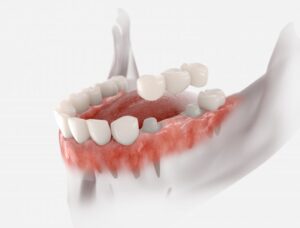
A dental bridge is a reliable and long-lasting solution for replacing missing teeth, restoring your smile, and improving your ability to chew and speak. While bridges can last many years with proper care, they are not invincible. Understanding the potential causes of bridge failure can help you protect your investment and enjoy your restoration for as long as possible.
Poor Oral Hygiene
Even though a bridge itself cannot get cavities, the teeth supporting it — called abutment teeth — can still decay. Plaque and bacteria can build up around the edges of the bridge if you don’t brush and floss effectively. Decay in the abutment teeth weakens the foundation, eventually causing the bridge to loosen or fail. Using floss threaders or interdental brushes can help keep these areas clean.
Gum Disease
Periodontal (gum) disease is another leading cause of bridge failure. If the gums and supporting bone around your abutment teeth become infected, the bridge can lose stability. Advanced gum disease can cause bone loss, which may no longer support the bridge properly. Regular dental checkups and professional cleanings are essential to catch gum problems early.
Bite and Alignment Issues
A dental bridge is designed to work with your bite. If your bite changes over time — due to teeth shifting, grinding (bruxism), or jaw problems — uneven pressure can develop on the bridge. This added stress can lead to cracks, loosened cement, or even breakage of the restoration. A nightguard may be recommended if you grind your teeth while sleeping.
Poor Fit or Dental Work Quality
Sometimes, a bridge may fail because of how it was made or placed. If the fit is not precise, gaps can allow bacteria to get underneath, leading to decay or gum problems. This is why it’s so important to choose a skilled dentist who uses high-quality materials and precise techniques.
Trauma or Injury
A sudden impact — such as a fall, sports injury, or accident — can damage a dental bridge. Even if the bridge does not completely break, a hard hit can loosen it or damage the supporting teeth. Wearing a custom sports mouthguard during athletic activities can help prevent this type of damage.
Normal Wear and Tear
Like any dental restoration, bridges experience wear over time. Constant chewing, exposure to acidic foods, and temperature changes can gradually weaken the materials. While high-quality bridges are durable, they may eventually need repair or replacement after many years of use.
A dental bridge can serve you well for a decade or more, but only if it’s cared for properly. Maintaining excellent oral hygiene, protecting your teeth from injury, addressing bite problems, and visiting your dentist regularly are key to extending the life of your bridge. If you notice looseness, discomfort, or changes in your bite, contact your dentist right away — catching issues early can often prevent total bridge failure.
About the Author
Dr. Chung Chien Hsia received his dental degree from the Nova Southeastern University College of Dental Medicine. He has since become certified to offer nitrous oxide sedation and taken a maxicourse through the American Academy of Implant Dentistry. This 300-hour interdisciplinary program combines lectures, demonstrations, and hands-on sessions to cover all aspects of treating patients who are candidates for dental implants. With this kind of experience and expertise, you can trust Dr. Hsia and our team to provide you with a long-lasting dental bridge. Schedule your appointment online or call our Richardson office at (214) 432-1133.




